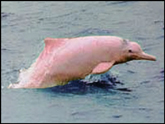 Trent University Scientists Working to Save Remaining 100 Humpback Dolphins in TaiwanFOR IMMEDIATE RELEASE Professor Brad White and Trent Students to Present Key DNA Evidence at International Dolphin Symposium Sept. 3-7, 2007 Monday, August 27, 2007, Peterborough
Renowned for their illuminating work with the highly endangered North Atlantic right whale, biology professor and Canada Research Chair in Conservation Genetics and Biodiversity Dr. Bradley White, along with Ph.D student Brenna McLeod and post-doctoral fellow Dr. Tim Frasier have spent the last six months studying the genetics of the dolphins in Trent’s DNA labs. Their research is essential in determining if the few animals found on the west coast of Taiwan are distinct from those found off the coast of Hong Kong and in other Chinese waters. “If the genetic data show that these dolphins are a distinct population, the issue then becomes how many there are,” explained Dr. White. “Present estimates indicate there are only around 100 left. This small number of a distinct and isolated population would allow designation as a highly endangered population.” Trent’s team will be joining other dolphin experts from around the world to evaluate the results of recent research projects in the second International Symposium and Workshop on the Conservation and Research Needs of the Indo-Pacific Dolphins, taking place in Taiwan from September 3-7, 2007. The goal of this workshop is to scientifically evaluate the dolphins’ status as a distinct population so it can be added to the endangered list managed by the International Union for the Conservation of Nature (IUCN). Unique for their pink skin colouring, Indo-Pacific humpback dolphins were discovered in 2002 living in the Taiwan Strait by Dr. John Wang, a biologist with the National Museum of Marine Biology and Aquarium. Dr. Wang has been examining their skin pigmentation to determine if the dolphins are an isolated group and will also be presenting his research at next month’s symposium. “If the IUCN accepts our findings, then it will assemble an international group of dolphin experts to produce a conservation strategy in the hopes of pressuring the Taiwanese government to protect their habitat,” said Dr. White. The dolphins’ preferred habitat is the warm shallow waters along Taiwan’s west coast, which brings them into close range of one of the region’s most seriously polluted areas. According to Dr. Wang, proposed large-scale plastics and petrochemical development projects within the small distributional area of these dolphins “is incredibly concerning.” Activities such as pile-driving during construction can also cause great disturbance or direct harm to the animals in addition to the physical removal of habitat by land reclamation. Increased vessel traffic servicing these factories can also have a long-term impact on the animals such as disturbance from increased noise, increased risk of boat strikes and increased discharge and emissions from vessels and increased risks of chemical and oil spills. Dr. Wang has recently launched a campaign to raise awareness of these dolphins and their impending demise should these industrial projects proceed. Dr. White and his team see their DNA work as part of the broader issue of determining who is ultimately responsible for the environmental degradation of threatened species. “I am deeply concerned about the level of carbon dioxide emitted in the production of plastics. Southeast Asia is home to some of the world’s largest plastic factories supplying many of the consumer goods sold here in Canada,” said Dr. White. “The next time you go to a store to buy plastic, think about where it originated and the impact these industries have on the coastal habitat of the highly threatened humpback dolphin.” The complexities of this issue are far-reaching. “Are Canadians responsible for the plight of the dolphin? These are interesting issues in a globalized world,” noted Dr. White. Dr. White holds a Canada Research Chair in Conservation Genetics and Biodiversity at Trent University and is the director of the Natural Resources DNA Profiling and Forensic Centre. -30- For further information, please contact: |

































 A team of Trent University scientists will soon be heading off to the National Museum of Marine Biology and Aquarium in southern Taiwan to present critical DNA research as part of an international effort to save the few remaining Indo-Pacific humpback dolphins found along coastal waters there.
A team of Trent University scientists will soon be heading off to the National Museum of Marine Biology and Aquarium in southern Taiwan to present critical DNA research as part of an international effort to save the few remaining Indo-Pacific humpback dolphins found along coastal waters there.